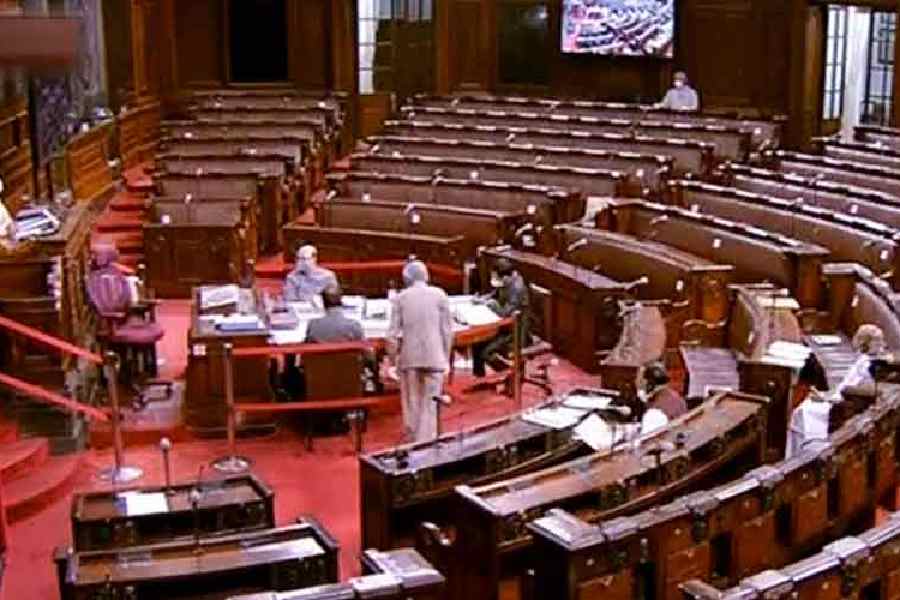The Rajya Sabha was adjourned sine die on Friday, bringing down the curtain on the Monsoon session which was marred by repeated disruptions by the opposition over the Manipur violence issue.
On the last day of the session, the Upper House was adjourned twice in the pre-lunch session amid an uproar by opposition members who demanded a discussion and Prime Minister Narendra Modi's statement in the House on the situation in Manipur.
Several attempts by the chair and the government to break the logjam in the House failed as no discussion on Manipur could take place despite the listing of a short-duration discussion on the matter under rule 176.
The opposition had been demanding a comprehensive discussion on the Manipur violence with a statement from the prime minister, under rule 267 that entails voting.
Before being adjourned sine die, the House returned to Lok Sabha two proposed legislations on the Central and Integrated GST laws by a voice vote without any discussion. The proposed laws seek to levy 28 per cent tax on the full face value of bets in online gaming, casinos and horse race clubs.
It also adopted a motion to suspend AAP MP Raghav Chadha from Rajya Sabha for "gross violation of rule, misconduct, defiant attitude and contemptuous conduct", pending a report by the privileges committee, and also extended the suspension of another AAP MP, Sanjay Singh, till the recommendation of the privileges committee.
A total of 44 hours and 58 minutes were lost during the 17 sittings of the House "due to avoidable disruptions adversely impinging on our overall productivity of this session", Chairman Jagdeep Dhankhar announced on the last day.
"We have been able to pass a few bills during the session that witnessed some lively and animated debate. We could take questions in a few occasions but I feel that the productivity of the question hour could have been much better," he said.
Some of the important bills passed were the Digital Personal Data Protection Bill 2023, Inter-Services Organisations (Command, Control and Discipline) Bill, Government of National Capital Territory of Delhi (Amendment) Bill, Press and Registration of Periodicals Bill, Offshore Areas Mineral (Development and Regulation) Amendment Bill, and the Cinematograph (Amendment) Bill-2023.
Dhankhar regretted that despite his best efforts and the government's willingness, the Manipur violence issue could not be discussed in the Rajya Sabha.
The Rajya Sabha chairman had accepted notices under rule 176, but the discussion could not start even after it was sought to be initiated last week. Later, a middle path was sought to be worked out for holding a discussion under rule 167, but nothing came out of the deliberations as both sides remained adamant on their respective stands.
"In Lok Sabha, the honourable home minister for more than an hour reflected only on Manipur. The honourable prime minister in his discourse focussed on Manipur, indicated to the nation a soothing and healing touch... 'Ab socho humne kya khoya, kya paya' (Now ponder what have we lost and what have we got?" Dhankhar told the House, where most of the opposition members were absent in the post-lunch session of the last day.
The chairman further said, "This House on account of unruly conduct, indecorous behaviour could not avail the historic opportunity of guiding the Lok Sabha on Manipur and that was on account of our actions. This was very painful. Once again we yielded to the allure of narrow interest, and allowed disorder to be the new normal in the proceedings of the House." Taking a dig at members of opposition parties who trooped to the well of the House during the session, he said, "Disorder cannot be allowed to be the order of the House. This has been weaponised as a political strategy and that is anti-democratic, anti-constitutional." Dhankhar asserted that he would not overlook such "transgressions".
"Coming to the well, rising on the seat, shouting slogans, coming with a garland of tomatoes, where are we heading? Forget about the people at large, your blood relations, your near and dear ones will not approve of it," he said, adding "few painful decisions" he took against some members were "in deference to my constitutional obligations".
He also took exceptions to media reporting about Rajya Sabha passing "bills in absence of opposition" saying it is "factually wrong" as "the members chose not to perform their constitutional duty... They walked out not from the House but from their solemn duty, their constitutional obligations." Dhankhar appealed to the media "to be more sensitive to the sentiments of the people at large and properly and fairly report the proceedings of the House".
On the other hand, he said, the Upper House also witnessed some positive developments in giving "fair representation to our dynamic women members" to be part of the panel of vice-chairpersons.
He lauded former sprint queen P T Usha and S Phangnon Konyak, who created history by becoming the first woman from Nagaland to preside over the proceedings of Rajya Sabha.
After his customary address, Dhankhar adjourned the House sine die. PTI RKL SKC SMN
Except for the headline, this story has not been edited by The Telegraph Online staff and has been published from a syndicated feed.











